Act for the Diocese of Botswana
This page, Act, is a work in progress, and it will always be a work in progress. Companion relationships between dioceses around the world focus upon relationship, so how we “relate” varies immensely and creatively, and no doubt will evolve over time. Thus, a work in progress.
Sometimes we get caught up in projects, convinced that we must do something with our companion link. Sometimes, though, we also get caught up on the relational side of things, as if somehow getting to know one another is all there is. While companion links are not to be a list of projects – especially one-sided ones – relationships may be built as we engage in ministry together. That is why, in our companion link agreement between Botswana and North Carolina, we named particular areas of ministry in which we wanted to share, first in 2008, and again in 2014.
On this Act webpage, we invite you to learn more about what we, and perhaps you, have already done, and to discover opportunities for relationship and ministry that appeal to you and your congregation or your organization. We have organized this page in line with our most recent companion link agreement.
Let us know of any initiatives or involvement you might wish for yourself or your congregation. Our companion link committee will work with you and our partners in Botswana to help your engagement become a rich experience in ministry.
Here are the subject areas from our companion link agreement:
- Support our life and ministries together through prayer.
- Expand congregational connections.
- Create opportunities for mutual ministry to and with our children and our youth, especially through orphan and vulnerable children care projects and efforts to address health and education concerns affecting the youth.
- Encourage the formation of clergy and the development of lay leadership and ministry.
- Support the ministries by women offered together in Botswana and North Carolina.
- Support ministries to and for persons with HIV/AIDS and to their families.
- Support hospice initiatives.
- Seek mutual discernment as we find ourselves called to other opportunities for shared ministry.
SUPPORT OUR LIFE AND MINISTRIES TOGETHER THROUGH PRAYER
We encourage you to remember the Diocese of Botswana in your personal prayer life, to pray for them in your Sunday worship, and occasionally to worship using the liturgy from the Diocese of Botswana. See our Pray page for further information.
EXPAND CONGREGATIONAL CONNECTIONS
An excellent place to start, certainly, is to learn more about Botswana and its Anglican Diocese. See our Learn page for further information.
If you would like someone from our companion link committee, or others who have been part of groups who have been to the Diocese of Botswana, to come and speak to your congregation, let us know!
As you look at our webpages about our shared ministry with Botswana, and one activity or another especially interests you, let us know, and we will see how you might be involved in that particular activity.
A word about money: Many things that we seek to do together cost money, either expensive travel or support for specific activities. But… we do not look to congregations simply to write a check, and we know that many cannot afford airfare from North Carolina to Botswana. And so, instead, we have been expanding our capacity to have “face-to-face” conversations through Skype and other media, so that we can build personal relationships with people in Batswana congregations and in some of their ministries.
Early in 2016, with our help, the Diocese of Botswana upgraded bandwidth at diocesan offices and at St. Augustine Theological School, and we provided equipment – projectors, laptops, enhanced speakers and microphones, and webcams. (Soon we hope to expand this capacity in Francistown, Botswana’s second city.) This means that if your parish or organization would like to connect via Skype with our partners in Botswana, including those engaged in particular ministries such as hospice, we can assist in making that possible. Contact the Rev. Leon Spencer to plan such a program.
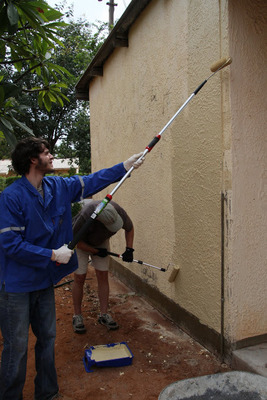 Here’s a report on one parish’s engagement with the Church in Botswana:
Here’s a report on one parish’s engagement with the Church in Botswana:
Christ Church, Charlotte, having benefitted from the diocesan link with Costa Rica, was anxious to begin a new adventure in ministry with Botswana. In 2011 a group of 10 men and women went for a 10-day mission trip that started in Gaborone. For several days, they were taken to visit numerous ministries in and around the capital city and toured historical sites and the Mokolodi nature reserve.
After worship at the Cathedral of the Holy Cross on Sunday, they travelled to Selebi-Phikwe, north-east of Gaborone, to do a two-day working visit at St. Andrew’s Church. The rector and members of the parish housed them in their homes. Their time was spent repainting the outside of the church itself. It was here, they say, that they “truly began to establish relationships and feel connected personally,” and they committed themselves to returning and spending their entire time in Selebi-Phikwe.
In 2013 they returned and spent a week staying with the people of St. Andrew’s, Selebi-Phikwe, doing more projects at the church. They painted the inside of the Sunday School building, tiled the kitchen floor, and did odd jobs to fix the church building. On this second trip they remained over a weekend. This meant that, as members of the church were off work, a large number of them came and worked with Christ Church folk on Saturday. On Sunday they not only worshiped at St. Andrew’s (the Rev. Marty Hedgpeth preached) but also out in the connected village church, St. Peter’s in Mmadinare. Their experience in the village church, they say, was full of “'African’ flavor while still being Anglican.” Christ Church’s Christian education director taught a Godly Play story to the village children outside under a tree. They are hoping to have another trip to a new area of Botswana in 2016.
Christ Church, Charlotte, offers these thoughts for parishes considering similar ministries. (1) Trips to Botswana are fairly expensive, which influences frequency. (2) It is also a long way to go, so the trips need to be 10-12 days long in order to manage travel and time change. (3) While getting oriented to the Diocese was important, they now prefer going to one town and developing relationships there. (4) At the end of their trips they had a two-day stay at a game reserve, but as the best reserves in Botswana are in the very north of the country, so far they have opted to visit a reserve in South Africa that had transportation to and from the Johannesburg airport.
CREATE OPPORTUNITIES FOR MUTUAL MINISTRY TO AND WITH CHILDREN AND YOUTH
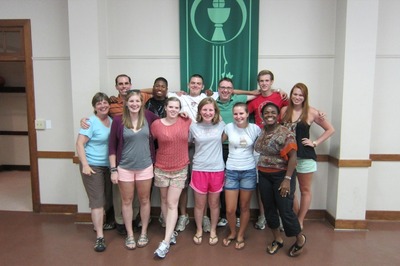 Since the beginning of the companion relationship between Botswana and North Carolina, coordination in sharing youth ministry has been a high priority. In the winter of 2009 a group of 10 Batswana young people (with accompanying adults) spent 10 days in North Carolina, visiting churches, experiencing American family life through their host families, spending time with Campus Ministry students, enjoying a college basketball game at UNC and participating in our diocese’s annual Bishops’ Ball. This was the beginning of many international friendships in this companion relationship.
Since the beginning of the companion relationship between Botswana and North Carolina, coordination in sharing youth ministry has been a high priority. In the winter of 2009 a group of 10 Batswana young people (with accompanying adults) spent 10 days in North Carolina, visiting churches, experiencing American family life through their host families, spending time with Campus Ministry students, enjoying a college basketball game at UNC and participating in our diocese’s annual Bishops’ Ball. This was the beginning of many international friendships in this companion relationship.
Two years later, a youth delegation of twelve from North Carolina joined another delegation from Newcastle, England, in a two week visit to Botswana and South Africa. The journey began with participation in a Guild (a ministry for young adults in Botswana) conference held in Serowe, which included a mission project on the Children’s Ward of the Sekgoma Memorial Hospital. The group concluded their time in Botswana sharing in an HIV/AIDS workshop facilitated by Sharita Womack, a former chair of North Carolina’s companion link committee. It was part of a conference “Growing in Christ: Supporting Healthy Bodies, Nurturing Healthy Relationships,” sponsored by the Millennium Development Goals sub-committee of the Diocese of North Carolina's Chartered Committee on Global Missions. Before departing for home, the American and British youth visited the Apartheid Museum in Johannesburg.
[View additional images of this experience.]
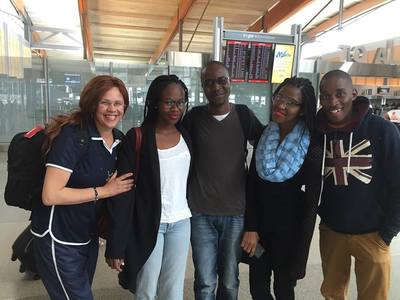 From 2015 through 2017, young adults from Botswana’s Diocesan Youth Executive Committee took part in the Diocese of North Carolina’s Lift Every Voice initiative, a three-year program to help young people develop the vision and tools to address injustice and build dioceses’ programming around race and inclusivity. Supported largely by a grant from the Jessie Ball DuPont Fund, the first phase toured and examined the racial historical truths of slavery and the Civil Rights movement in North Carolina as well as the current realities of migrant farmworkers in the state. The second phase of Lift Every Voice took place in 2016; A Pilgrimage of Reconciliation in South Africa focused on the history of Apartheid in South Africa and the work of the Truth and Reconciliation Commission. The third phase in 2017 consisted of a return to North Carolina for a five-day conference, where participants practiced nonviolent communication skills, identified systems of oppression and began developing tools and programs for continuing these practices back home within their dioceses and communities. Youth from Botswana participated in all three.
From 2015 through 2017, young adults from Botswana’s Diocesan Youth Executive Committee took part in the Diocese of North Carolina’s Lift Every Voice initiative, a three-year program to help young people develop the vision and tools to address injustice and build dioceses’ programming around race and inclusivity. Supported largely by a grant from the Jessie Ball DuPont Fund, the first phase toured and examined the racial historical truths of slavery and the Civil Rights movement in North Carolina as well as the current realities of migrant farmworkers in the state. The second phase of Lift Every Voice took place in 2016; A Pilgrimage of Reconciliation in South Africa focused on the history of Apartheid in South Africa and the work of the Truth and Reconciliation Commission. The third phase in 2017 consisted of a return to North Carolina for a five-day conference, where participants practiced nonviolent communication skills, identified systems of oppression and began developing tools and programs for continuing these practices back home within their dioceses and communities. Youth from Botswana participated in all three.
Meanwhile, the Diocese of North Carolina has been supportive of a ministry for orphans and vulnerable children at the St. Peter’s Day Care Centre in Mogoditshane, just outside Gaborone. It began when the scourge of HIV/AIDS spread across Botswana, leaving many orphans. The Diocese of Botswana began this pre-school center, with seven children and a minimal staff and a small gathering space, which has grown into more than 80 children, a good teaching staff, and new classrooms for what are now called ‘orphans and vulnerable children.’ People from North Carolina have made gifts of toys and clothing. And Karen Spencer, from St. Andrew’s in Greensboro, taught art and offered art workshops for teachers at St. Peter’s in 2013.
ENCOURAGE THE FORMATION OF CLERGY AND THE DEVELOPMENT OF LAY LEADERSHIP
Throughout most of its history, the Diocese of Botswana has had a severe shortage of priests. Moreover, the options for training those who did come forward were limited – mainly overseas, at the Church of the Province of Southern Africa’s theological college, or through extension courses. For a variety of reasons, these options proved unsatisfactory.

[For a discussion of this issue, see Bishop Michael’s interview with Bishop Metlha below. The part about theological education begins at 7:32.]In 2010 the Rev. Leon Spencer, a priest in the Diocese of North Carolina with experience in African theological education, spent several months in Botswana working with the Rev. James Amanze, a theologian who chairs Botswana’s companion link committee. Together they held workshops with laity and clergy, and they investigated a variety of options for ministerial formation. It was clear that the Diocese wanted training to occur locally, to lead to an academic recognition, and to be oriented toward ordination. They considered it important to strengthen lay education, but ordination, they felt, came first.
In 2012 The Diocese of Botswana inaugurated the St. Augustine Theological School, with thirteen ordinands accepted by the Bishop. They entered a three-year program, leading to either a certificate or diploma. Approximately half of the ordinands came from around Gaborone, and they met for classes each weekday evening. The other half came from elsewhere in Botswana, and they came for an intensive week of study on several occasions during a term. In 2014 there was a second intake of ten ordinands. Late in the year, ordinands from the first intake were ordained to the diaconate.
With the support of Bishop Curry, the Rev. Spencer returned to Botswana for six months in 2013 to teach during the second semester of the first year. He returned again in 2014 and 2016 to teach for additional terms.
[Read more about his experience in his Botswana Diary.]
Meanwhile, the Rev. Murdock Smith, then chair of the companion link committee, arranged to secure a photocopier for the School. This may seem a passing matter, but given that students lacked textbooks, being able to provide handouts and other materials for them enriched their studies immensely. We also presented biblical commentaries to St. Augustine students.
Our companion link committee designed a Support a Seminarian initiative, seeking funds to assist specific ordinands, who would enter into relationship with parishes here through e-mail and other connections. Our hope is that this possibility will mature as the School continues.
The Diocese of North Carolina also brought two Batswana for Education for Ministry (EfM) for mentor training, and an EfM group was formed on their return to Botswana.
The Botswana and North Carolina companion link committees are now looking at ways to provide workshops and other training for lay leadership.
SUPPORT THE MINISTRIES BY WOMEN OFFERED TOGETHER IN BOTSWANA AND NORTH CAROLINA
The Episcopal Church Women (ECW) of the Diocese of North Carolina have been part of the North Carolina-Botswana companion link since its inception in January 2008. Though separated by great physical distance, the ECW and the women’s ministries in Botswana – the Mothers’ Union (MU) and the Anglican Women’s Fellowship (AWF) - have worked steadily to grow together and nurture mutual ministry.
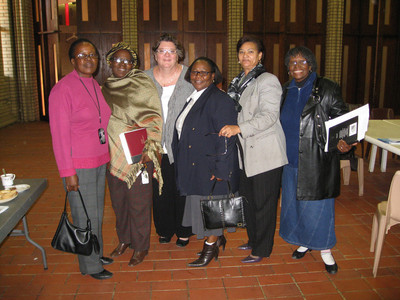 In June 2008 Lisa Towle, president of the ECW in North Carolina, first visited Botswana as part of a delegation from the Diocese of North Carolina. The building of interpersonal relationships continued in November 2008 when the ECW of NC hosted Colleen Segokgo, then the president of the Mothers’ Union of Botswana, and Florence Bogopa, then the president of the Anglican Women’s Fellowship of Botswana, during the ECW’s annual diocese-wide convention.
In June 2008 Lisa Towle, president of the ECW in North Carolina, first visited Botswana as part of a delegation from the Diocese of North Carolina. The building of interpersonal relationships continued in November 2008 when the ECW of NC hosted Colleen Segokgo, then the president of the Mothers’ Union of Botswana, and Florence Bogopa, then the president of the Anglican Women’s Fellowship of Botswana, during the ECW’s annual diocese-wide convention.
At the request of the Mothers’ Union, Lisa Towle returned to Botswana in August 2010 to address the MU’s annual conference, the theme of which was taken from Philippians 4:13 (“I can do all things through Christ who strengthens me”). And in April 2013, Lisa attended the multi-day celebration of the AWF’s 20th anniversary. While there she spoke to the theme, “Revive, Relate, Rejoice, Women of God.”
November 2014 proved to be a particularly busy month for Episcopal Church Women in North Carolina and the Anglican women of Botswana. First, a weeklong stay in NC by five women from Botswana centered on participation in a social justice-oriented ECW conference about human trafficking both domestically and internationally. This visit was followed by one by the Bishop of Botswana, the Rt. Rev. Metlha Beleme, and his wife, Thapelo Beleme. The ECW helped with the advance planning of their schedules, provided multiple types of assistance during the week they were in-state, and hosted Mrs. Beleme.
Though travel to each other’s dioceses has been invaluable in strengthening the foundation of relationships, much of the work of the companion link takes place in the virtual and faith space between visits. For example, these women’s ministries have held each other in intentional prayer. They have shared information about programs providing a direct benefit to women and children, and then worked together to find funding for some of those programs, including requests for grants from the Diocese of North Carolina’s Chartered Committee on Global Missions and the Episcopal Church’s United Thank Offering (founded and still administered by the women of the Church). Episcopal Church Women in North Carolina have knitted hundreds of “comfort dolls” for orphans and vulnerable children in Botswana, and these have been distributed by the women of the Diocese of Botswana.
To further understand the companion link, particularly its women’s ministry component, presentations have been given by women to parishes and in meetings of the ECW, MU, and AWF. Let us know if you would like to arrange for such a presentation.
Now, the ECW, AWF and MU are examining a new set of priorities for shared ministry. Contact Mary Gordon for further information.
SUPPORT MINISTRIES TO AND FOR PEOPLE WITH HIV/AIDS / SUPPORT HOSPICE INITIATIVES
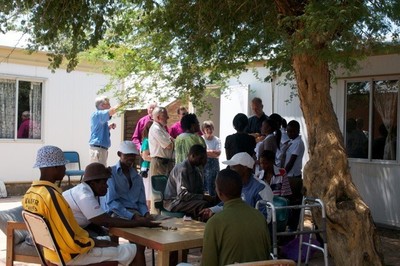 HIV/AIDS and the development of a hospice program in the Diocese of Botswana are closely related. Established in 1994 as an initiative of the Cathedral, Holy Cross Hospice has been reaching out to people with HIV and AIDS and other life-limiting illnesses who live in the poor communities of Gaborone. They provide nutritional, medical, nursing, social, emotional, and spiritual support through their on-site adult day-care program and home-based services. Most recently, they have initiated a residential program as well.
HIV/AIDS and the development of a hospice program in the Diocese of Botswana are closely related. Established in 1994 as an initiative of the Cathedral, Holy Cross Hospice has been reaching out to people with HIV and AIDS and other life-limiting illnesses who live in the poor communities of Gaborone. They provide nutritional, medical, nursing, social, emotional, and spiritual support through their on-site adult day-care program and home-based services. Most recently, they have initiated a residential program as well.
The Diocese of North Carolina, especially through initiatives at St. Anne’s in Winston-Salem, have supported the hospice program in Botswana. We will provide more details about this ministry in the near future.
Do you have your own ideas for ministry in our companion link with Botswana? Let us know!
